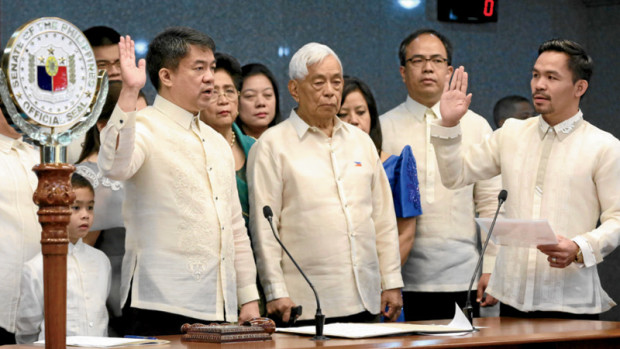
Senate President Aquilino Pimentel III (left) and his father former Senate President Aquilino Pimentel Jr. (center). MARIANNE BERMUDEZ/INQUIRER FILE PHOTO
MANILA, Philippines— Senate President Aquilino “Koko” Pimentel III on Thursday renewed his push for the country’s shift to a “uniquely Filipino” federal system of government, citing how the unitary system that has concentrated power and funds to the central government has hampered development in the countryside.
Teaming up with his father former Senate President Aquilino “Nene” Pimentel Jr., a long-time federalism advocate, in a forum at the Senate, Pimentel said the Philippines could look at the “best features” of the federal system in other parts of the world to craft a system that is the Philippines’ own.
“Federalism’s complex nature demands careful study. Scholars contend that there is not one model in the world that fits all. Each country must discern its own version of federalism according to peculiar conditions in its society,” said the younger Pimentel in his keynote speech.
“Therefore, it is important to learn from experiences–whether good or bad–of existing federations,” said Pimentel, citing existing systems across Europe, North America, Australia, neighboring Malaysia, and “emerging federations” in Latin America and Africa.
READ: Federalism’s time has come, says Nene Pimentel
Pimentel, who has vowed to launch an “intensified information drive” to sway more Filipinos toward supporting the system shift, said that while federalism “is not a perfect system, it may be the answer to the country’s lingering problems” that could be traced to the cultural diversity across regions.
A recent Pulse Asia Survey showed that 44 percent of Filipinos were against revising the 1987 Constitution to give way to the shift to federalism, while 37 percent were for the proposal.
Under the system, the Philippines will be divided into several federal states, each with sovereign powers over its affairs. This decentralizes governance, said Pimentel, equalizing the access to funds that may be utilized for development and granting local government’s greater autonomy.
The country will, however, have “one Constitution, one armed forces, one flag and anthem, one central bank, one monetary system, one foreign policy, and one public education system, among others.”
“For me, federalism rests on the principle that the smallest unit of government knows what is best for the needs of its constituents,” Pimentel said.
“I have always believed that greater autonomy must be granted to the far flung regions of our country that are neglected and left behind in economic development,” he said.
His father, the elder Pimentel, is proposing 11 federal Philippine states: four in Luzon (Northern, Central, Southern Luzon and Bicol), four in the Visayas (Eastern, Central, and Western Visayas and a new grouping for Mindoro, Palawan, Romblon and Marinduque as he believes it is closer to Visayas), and three in Mindanao (Northern and Southern Mindanao, and the federal state of the Bangsamoro).
He said Metro Manila “will not be treated as a separate state but will remain the federal capital.”
The father and son said federalism is not being proposed as a “cure-all” for the country’s problems, but as a way to make opportunities for development more equitable across the country’s regions.
READ: Federalization not a panacea
“Do not expect that all problems will be solved by federalism, but at least the problem of concentration of power to the Metro Manila government will be addressed,” said the elder Pimentel, proponent of the 1991 law for the devolution of powers to local governments. CDG/rga